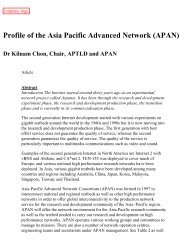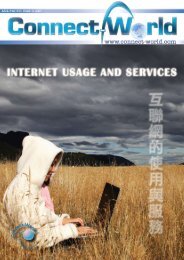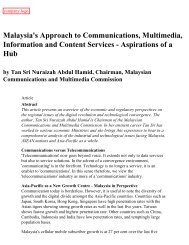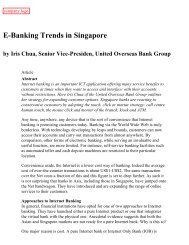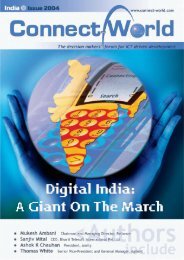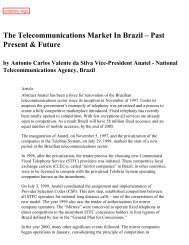Authors include: - Connect-World
Authors include: - Connect-World
Authors include: - Connect-World
Create successful ePaper yourself
Turn your PDF publications into a flip-book with our unique Google optimized e-Paper software.
Mobile telephony<br />
the lowest tariffs anywhereontheAfricancontinent.<br />
Equally important has<br />
been the increase in<br />
Uganda’s public access<br />
services. Initially, the<br />
telecoms operators’<br />
Universal Access obligations<br />
spurred the growth<br />
of public access.<br />
Subsequently public<br />
access evolved into a<br />
small-investoropportunityasindividualUgandans<br />
begantoofferpaidpublic<br />
access using their own<br />
phones.<br />
The country now has an estimated<br />
50,000publicaccesspointslocatedin<br />
grocery stores, barbershops and on<br />
the streets. GSM mobile phones providemostofthisaccessand,onaverage,eachservestento50usersaday,<br />
dependingonthelocation.<br />
Mobiletelephonybenefitsin<br />
Uganda<br />
MobiletelephonyhasenabledUganda<br />
andothercountriestoleapfrogseveral<br />
generations of communications technology.Today,Ugandanshaveaccess<br />
to services that previously were the<br />
exclusivepreserveofthosewithaccess<br />
tofixedlineservices.<br />
The financing of telephone service<br />
rolloutinruralareaswasonceconsideredwaybeyondthemeansofdevelopingcountriessuchasUganda.Asan<br />
example,thecompetitivemobileoperator’slicenceinUgandarequireditto<br />
install89,000linesinafive-yearperiodbeginningin1998.Atthetime,all<br />
thoughtthisaformidable,difficultto<br />
achieve, target. They based this<br />
assumption on the fixed wire-line<br />
model.<br />
Taking a developmental approach,<br />
using international development<br />
grantsandloans,wasthoughttheonly<br />
waytoaddressthechallengesofanatural<br />
monopoly and of developing a<br />
nationwidetelecommunicationsinfrastructure.<br />
However, liberalisation,<br />
based upon a progressive regulatory<br />
regime, stimulated a mobile explosion.Todate,themarkethasslightly<br />
over 1,000,000 mobile users, 65 per<br />
cent of these are on the competitive<br />
operator’snetworkalone.<br />
Mobile Telephony has had a great<br />
impactonUgandansystemsofgovernance.<br />
Because of widespread GSM<br />
Figure 1: Improved policy and regulation, as well as higher competition, have<br />
played an important role in the sector’s growth.<br />
deployment, e-Government is rapidly<br />
becoming a reality. The country’s<br />
recentlyapprovedICTpolicypointsto<br />
e-Governmentasaspecificgoaltobe<br />
achieved in addition to the goal of<br />
effectively employing ICT to better<br />
Uganda’seconomicsituation.<br />
Mobiletechnology<br />
The economic success that Uganda<br />
hasenjoyed,withGDPgrowthofover<br />
fivepercentperannum,mightnever<br />
havebeenrealised,mightneverhave<br />
reached the same level, without the<br />
exponential growth of telecommunication<br />
services made possible by<br />
mobile technology. Indeed, the competitive<br />
mobile operator, a company<br />
thatstartedoperationsinUgandajust<br />
seven years ago, is now the second<br />
greatestsingletaxpayerinUganda.<br />
"The financing of telephone<br />
service rollout in<br />
rural areas was once<br />
considered way beyond<br />
the means of developing<br />
countries such as<br />
Uganda."<br />
Businesses of all sizes comprise the<br />
country’s diverse economic sectors<br />
and mobile telephony has connected<br />
them all, from the small farm dealer<br />
checking the price of produce, to the<br />
stranded fisherman contacting the<br />
collectionvanathisdock,tobusinessmen<br />
negotiating off-shore investments,<br />
and all have benefited as a<br />
result.<br />
Social interaction in Uganda has not<br />
been the same since the advent of<br />
mobile telephony. In a land where<br />
social bonds are highly regarded,<br />
accessible and affordable<br />
communication, a text<br />
messaging or a quick<br />
phone call, is a welcome<br />
additionanyday.<br />
Futurechallenges<br />
In spite of its rapid<br />
growthinmobiletelephony,Uganda’sfivepercent<br />
mobile penetration lags<br />
behind its neighbours<br />
Kenya with 12 per cent,<br />
Tanzania with 10 per<br />
cent, and many other<br />
African countries. Still<br />
Uganda’s prices are the lowest in the<br />
EastAfricanregionandsteadygrowth<br />
isexpected.<br />
Uganda’spolicymakerswanttokeep<br />
increasingcompetition,hencethenew<br />
telecompolicy,upontheexpiryofthe<br />
initialexclusivityperiodinJuly2005,<br />
willprobablyaimhighandcallforthe<br />
growth of tele-density to 20 per cent<br />
by the year 2010. Mobile and fixed<br />
wirelesstelephonyseemtobetheonly<br />
ways to meet such an ambitious target,<br />
given the time and investment<br />
neededtorolloutwirelinecapacityin<br />
ruralareas.<br />
Thereare,however,certainmacrofactors<br />
holding back the growth in<br />
demandthatneedtobeaddressedto<br />
meetUganda’sambitiousgoals.<br />
The high taxes charged users for<br />
mobile services are among the most<br />
important inhibiting factors. These<br />
taxes, including a 12 per cent excise<br />
dutychargedonlyformobileservices,<br />
totalapproximately30percent.Low<br />
demand is also a direct result of the<br />
country’sUS$330percapitaincome.<br />
ThelowpenetrationofICT,including<br />
thelackofresidentialPCs,greatlylimits<br />
the use of enhanced non-voice<br />
mobiletelephonyservices.<br />
Mobiletechnologycandeliversomeof<br />
these services and are being consideredbymobileserviceproviderswho<br />
will soon introduce GPRS services to<br />
both the pre-paid and post-paid customerbase.Mobileoperatorsarealso<br />
driving the convergence of fixed and<br />
mobiletelephonybyintroducingmore<br />
advancedtechnologiessuchasCDMA<br />
andfibreopticforconnectionstothe<br />
network.<br />
55



